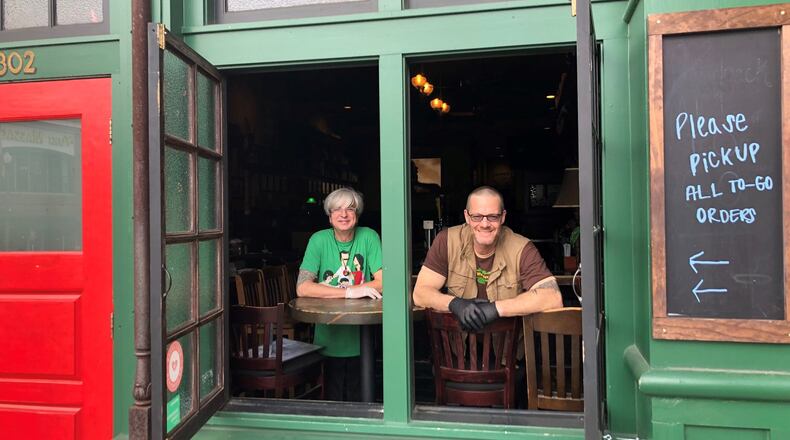Atlanta Mayor Keisha Lance Bottoms’ decision Thursday to close in-person restaurant dining in the city will impact roughly 3,000 establishments and the livelihoods of about 100,000 industry employees.
Bottoms executive order also shuttered bars, nightclubs, private social clubs, fitness centers, gyms, movie theaters, bowling alleys and arcades — but left restaurants with the ability to continue offering takeout and delivery, a model that many were already moving towards as patrons stayed home during the coronavirus pandemic.
Roughly 70 to 80 percent of restaurants have already closed, said Karen Bremer, chief executive of the Georgia Restaurant Association.
At least 32 states have banned in-person dining as of Thursday according to the trade publication Restaurant Business.
Businesses and their workers are taking it on the nose as governments continue with ever-more stringent steps to slow the disease’s spread. The restaurant industry has been particularly hard hit in metro Atlanta, and their pivot to delivering food leaves most in survival mode with few working employees at best.
Philip Roness, co-owner of the Meehan’s Public House on Peachtree Street and another in Vinings, had already moved to the delivery model. He said staff were concerned about getting the virus.
“St. Paddy’s morning, I asked them who wants to leave? They all raised their hands,” he said.
So Meehan’s and the company’s Steak 101 restaurant simplified menus and started delivering or allowing pickup of meals and drinks, including alcohol.
“We are treating this as a food truck without wheels,” he said outside the Vinings Meehan’s.
But only about four of the restaurant’s more than 20 Vinings employees were working Thursday.
Atlanta is at least the fourth city in Georgia to close restaurants and bars. Brookhaven, Clarkston and Dunwoody have adopted in-restaurant dining bans that are in effect or going into effect. And Sandy Springs is expected to pass a similar measure on Friday that could include retail shops.
‘Extraordinary police power in emergency’
Under Atlanta's charter, the mayor can exercise "extraordinary police power in times of emergency" at her discretion.
Bottoms' stood in contrast to Georgia Gov. Brian Kemp, who expressed concern Thursday about government overreach and who continues to resist using his emergency powers to mandate similar closures and restrictions across the state.
Bottoms said on twitter that the order, which allows cafeterias in hospitals and nursing homes to remain open, would go into effect at 12 a.m. on Friday. She also signed an administrative order suspending parking enforcement to help restaurants provide takeout services.
Retaurant owners are now keeping their eyes on Washington, as Congress works on relief programs such as low-interest loans to help them weather the storm.
“We are interested in that, but not going to rely on it,” said Toby Franklin, the CEO and parter with Ford Fry’s Rocket Farm Restaurants empire.
“We are looking for ways to fund ourselves though emergency bank funding, maybe more private equity. So we are intent to move as fast as we can to secure out border ourselves.”
The National Restaurant Association has estimated an industry-wide sales decline of $225 billion over the next three months.
Franklin closed restaurants Tuesday and began moving to the delivery model while keeping his furloughed 1,159 hourly employees on staff. They are not getting paid but can still access health benefits.
“We are treating this as if it’s a (Family and Medical Leave Act) event,” Franklin said. “We are big enough to provide benefits to our people and particulary medical benefits are really important in a medical emergency.”
“That is administratively challenging to pull that off,” he said, but they believe it is the right thing to do.
Emory Healthcare President and CEO Jonathan S. Lewin, MD, praised Bottoms’ move: “Her bold actions will directly save many lives across our city, and we hope that others around metro Atlanta will follow this example to help flatten the curve of the COVID-19 pandemic and ensure our health care infrastructure can meet the needs.”
In a letter to Bottoms dated Monday, Bremer asked that the city waive penalties for late restaurant excise tax payments, extend deadlines for business license renewals and to allow take out bear and wine sales because of the in-person dining ban.
A spokesman for the mayor didn’t respond to questions about whether the city had considered granting any those specific reliefs.
Page Olson, co-owner of Cafe Intermezzo in Midtown, said she and her husband closed their restaurant on Tuesday after President Trump advised the public to avoid bars and restaurants.
“Everybody just nosedived,” she said. “We just figured it was a matter of days before the cities would step in, because the state is not.”
Olsen said they have used the restraurant’s last stock of perishable food to prepare 3,000 hot meals for laid-off restaurant workers.
Keep Reading
The Latest
Featured




